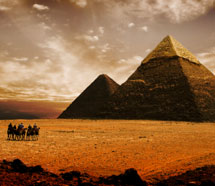
“We were slaves to Pharaoh in Egypt” (Deut. 6:21).
We were slaves to Pharaoh, not Pharaoh’s slaves. The former would be only a juridic-social description; the Jews belonged to Pharaoh legally, but spiritually were free people with their own minds and an independent approach to reality. However, when we state that someone is “Pharaoh’s slave,” we identify his whole personality with Pharaoh. Serving Pharaoh is not just incidental; it is the whole purpose of his life. Pharaoh’s Egyptian slaves are called “avdei Far’oh” (Gen 50:7; Ex. 10:7, 11:3). Our service to the Almighty is not something foreign and incidental, but rather something indispensable to our existence, something intrinsic and inseparable from our ontological awareness. That is why the term “eved Hashem, God’s servant” is used in the Bible. We are just servants of God, and nothing else.
The Jews in Egypt were slaves only in a political-economic sense. Had they been slaves existentially, had they lost their love of freedom and their spiritual heritage, had they been “Pharaoh’s slaves” and not just “slaves to Pharaoh,” they never would have been liberated. They would have lost their personality and their quest for freedom. For the Jews, slavery was extrinsic, not intrinsic. It did not destroy their inner personality. Even in the crucible of slavery and oppression, the Jews had not forfeited their dignity and sense of loyalty. They remained the children of the patriarchs, hoping and praying for a better future. Since slavery had not corrupted them fully, and since they remained spiritually free, the great miracle of the Exodus took place.
Moses had doubts about the Jews’ eligibility for freedom. He thought of them as slaves, especially after his very unpleasant experience with the two Hebrew slaves who were fighting. Moses was in despair, wondering whether the Jews were worthy of redemption. Therefore, God presented him with the very strange revelation of the burning bush. In its middle was a fire, while its outside was cold and dark. From the outside , it looked just like any other thorn bush in the desert; but inside that bush, in its hidden center, there was a fire burning. The ecstasy of the Jews for God, their commitment to His path, had never been extinguished in Egypt. It was rather invisible, covered up. God told him, “Ra’oh ra’iti, I have surely seen the wretchedness of My people who are in Egypt” (Ex. 3:7). Our Sages say, “Atah ro’eh re’iyah a?at” – meaning, you see only My people in Egypt – “va-Ani ro’eh shetei re’iyot” – whereas I penetrate into the depths (Ex. Rabbah 3). And once we penetrate into the depth of a Jew, no matter how repugnant his exterior, no matter how subservient he is to the taskmaster, we will find him questing for freedom and searching for God. Within every Jew, there is a burning bush. The Jew himself has never become Pharaoh’s slave, but only a slave to Pharaoh. “We were slaves to Pharaoh in Egypt,” but we remained free, even during the time of oppression.
Why does the Haggadah specify that “We were slaves to Pharaoh in Egypt”? Does it make any difference whether we were slaves to Pharaoh or to someone else? Apparently it is important. There are two types of relationship between master and slave. Sometimes a slave is owned by an individual, and sometimes the slave is the property of the state.
Both forms of bondage are degrading, but there is a distinction between private and public bondage. When owned by an individual, a slave may attain a position of power in the master’s household. The best example is Joseph, who had Potiphar’s complete trust. However, if the slave is the property of a cold, merciless, cruel corporate state, then no personal relationship is imaginable, no friendship or sympathy will ever be aroused, no personal contact developed. Usually the slaves of the state lose their identity; no matter how long the prisoner stays in jail, he is as new to the warden as he was the first day. The same impersonal, indifferent, cruel relationship persists from day to day, week to week, year to year. There is not a single bit of humanity in the institution of state slavery.
This is what the Haggadah emphasized: We were slaves not only to Pharaoh, but “to Pharaoh in Egypt.” Egypt was a corporate state, whose head was Pharaoh. The Pharaoh was not an individual; indeed, we do not know his individual name. Even the personality of the king was erased! In a slave society, individuality submerges into a common pool, the faceless crowd of slaves. This is the meaning of the phrase Avadim hayinu le-Far’oh be-Mi?rayim. We were his faceless slaves, and the relationship was impersonal. And, of course, an impersonal relationship is a cruel relationship.
Excerpted from The Seder Night: An Exalted Evening by Rabbi Joseph B. Soloveitchik.
More information on the book can be found here: www.ou.org/oupress
The words of this author reflect his/her own opinions and do not necessarily represent the official position of the Orthodox Union.

